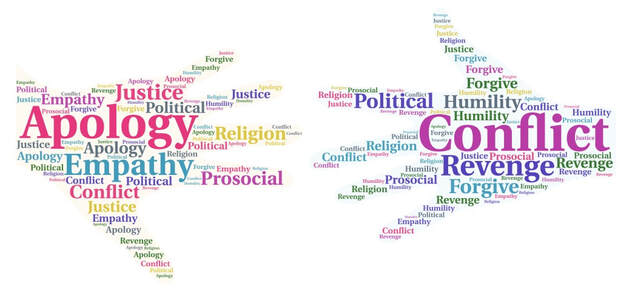Publications
|
Papers are linked solely as a convenience to ensure timely dissemination of scholarly and technical works on a non-commercial basis. Copyright is maintained by authors or publishers, and it is understood that persons accessing this information will adhere to the terms of the copyright and will not repost or disseminate without explicit permission.
|
|
Schumann, K., & Dragotta, A. (née Vazeou-Nieuwenhuis). (In Press). Empathy as a predictor of high-quality apologies. European Journal of Social Psychology.
Leunissen, J., Schumann, K., & Sedikides, C. (In Press). Self-protection predicts lower willingness to apologize. Journal of Social Psychology. Schumann, K., & Walton, G. (In Press). Rehumanizing the self after victimization: The roles of forgiveness versus revenge. Journal of Personality and Social Psychology. Koetke, J., Schumann, K., & Porter, T. J. (In Press) Intellectual humility as a predictor of news literacy skills for COVID-19 misinformation. Social Psychological and Personality Science. Koetke, J., Schumann, K., & Porter, T. J. (In Press). Trust in science increases conservative support for social distancing. Group Processes and Intergroup Relations. Schumann, K., & Dragotta, A. (née Vazeou-Nieuwenhuis). (In Press). Is moral redemption possible? The effectiveness of public apologies for sexual misconduct. Journal of Experimental Social Psychology. PDF Porter, T. J., Schumann, K., Selmeczy, D., Trzesniewski, K. (2020). Intellectual humility predicts mastery behaviors when learning. Learning and Individual Differences, 80. PDF Schumann, K. (2020). A force for good: When and why religion predicts prosocial behavior. Journal of Moral Theology, 9, 34-50. PDF Schumann, K. (2019). Apologies as signals for change? Implicit theories of personality and reactions to apologies during the #MeToo movement. PLOS One, 14. PDF Schumann, K. (2018). The psychology of offering an apology: Understanding the barriers to apologizing and how to overcome them. Current Directions in Psychological Science, 27, 74-78. PDF Vazeou-Nieuwenhuis, A., & Schumann, K. (2018). Self-compassionate and apologetic? How and why having compassion toward the self relates to a willingness to apologize. Personality and Individual Differences, 124, 71-76. PDF Schumann, K. & Orehek, E. (2017). Avoidant and defensive: Adult attachment and quality of apologies. Journal of Social and Personal Relationships, 1-25. PDF Porter, T. J. & Schumann, K. (2017). Intellectual humility enhances openness to learning about the opposing view. Self and Identity, 1-24. PDF Hornsey, M.J., Schumann, K., Bain, P.G., Blumen, S., Chen, S., Gomes, A., Guan, Y., Kashima, E., Lebedeva, N., & Wohl, M.J.A. (2017). Conservatives are more reluctant to give and receive apologies than liberals. Social Psychological and Personality Science, 8, 827-835. PDF Schumann, K., & Dweck, C. S. (2014). Who accepts responsibility for their transgressions? Personality and Social Psychology Bulletin, 40, 1598-1610. PDF Schumann, K., Zaki, J., & Dweck, C. S. (2014). Addressing the empathy deficit: Beliefs about the malleability of empathy predict effortful responses when empathy is challenging. Journal of Personality and Social Psychology, 107, 475-493. PDF Schumann, K., McGregor, I., Nash, K. A., & Ross, M. (2014). Religious magnanimity: Reminding people of their religious belief system reduces hostility after threat. Journal of Personality and Social Psychology, 107, 432-453. PDF Schumann, K. (2014). An affirmed self and a better apology: The effect of self-affirmation on transgressors’ responses to victims. Journal of Experimental Social Psychology, 54, 89-96. PDF Laurin, K., Schumann, K., & Holmes, J. G. (2014). A relationship with God? Connecting with the divine to assuage fears of interpersonal rejection. Social Psychological and Personality Science, 5, 77-85. PDF Schumann, K. (2012). Does love mean never having to say you’re sorry? Associations between relationship satisfaction, perceived apology sincerity, and forgiveness. Journal of Social and Personal Relationships, 29, 997-1010. PDF Schumann, K., & Ross, M. (2010). Why women apologize more than men: Gender differences in thresholds for offensive behavior. Psychological Science, 21, 1649-1655. PDF Schumann, K., & Ross, M. (2010). The benefits, consequences, and paradox of revenge. Social and Personality Psychology Compass, 4, 1193-1205. PDF Schumann, K., & Ross, M. (2010). The antecedents, nature and effectiveness of political apologies for historical injustices. In D.R. Bobocel, A.C. Kay, M.P. Zanna, & J.M. Olson (Eds.), The Ontario Symposium: Vol. 11 The Psychology of Justice and Legitimacy (pp. 299–324). New York, NY: Psychology Press. PDF Blatz, C. W., Schumann, K., & Ross, M. (2009). Government apologies for historical injustices. Political Psychology, 30, 219-241. PDF |


